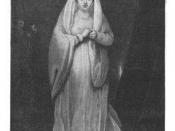In Macbeth by William Shakespeare, Lady Macbeth's desire for power prompts her interest in controlling Macbeth's actions; consequently, when she loses control of Macbeth, she loses control of herself. Lady Macbeth relies on Macbeth to be the brawn so she can be the brain; she has somewhat of a
symbiotic relationship with him. After the murder of Duncan, Macbeth slowly starts losing the need for and interest in Lady Macbeth. This loss of interest removes Lady Macbeth's access to power and eventually begets her demise. However, in the beginning she is a key factor in Macbeth deciding to follow through with the murder.
Lady Macbeth's impetus for Macbeth to kill Duncan shows she is able to control Macbeth. She sees Macbeth as a weak man who is unable to carry out any wrongful act. Lady Macbeth says, "[...] I do fear thy nature; / it is too full o' the' milk of human kindness / to catch the nearest way" (1.5.16-18),
which implies that she feels Macbeth is too kind to kill Duncan. She decides the only way to get what she wants is to intimidate Macbeth. When Macbeth says, "Bring forth men-children only; / For thy undaunted mettle should compose / Nothing but males," (1.7.72-74) Mabeth's fear of his wife really come to surface. She has a very masculine and powerful personality. Carolyn Asp, in her essay Tragic Action and Sexual Stereotyping in Macbeth says, "Masculine and feminine impulses are at war within her; she is unable either to fuse them or to polarize them" (Asp 203) which shows how she would like to be able to act like a man, but is unable to fully change because she still has many feminine influences on her life. Lady Macbeth asks to have her womanliness stripped...


